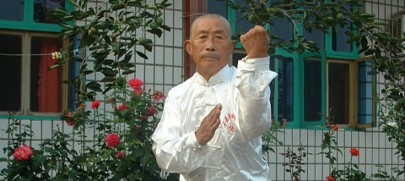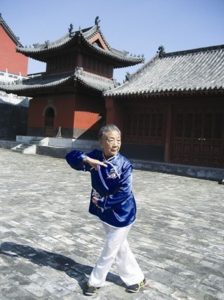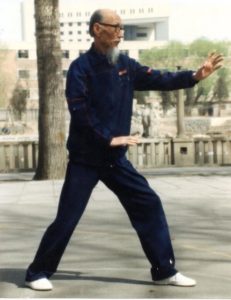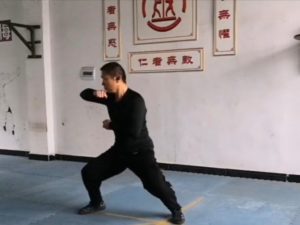Our Taiping Chuojiao consists of a number of influences including those from Beiduanzhuang (Raoyang), Zhaoduanzhuang (Lixian), Zhujiaozuo (Lixian), Beiguodan (Lixian), Nanquantou (Gaoyang) and Liushicun (Lixiain). Here we outline the Zhujiazuo line of Chuojiao which was central to spreading Chuojiao across different villages in Lixian and Gaoyang.
Wang Luocang, also known as Wang Yingfeng (英峰) and nicknamed the ‘Flying Rat’, was from Zhujiazuo Village, Liushi Town, Hebei Province (which is between Li county and Gaoyang county). Since childhood he had shown great interest in martial arts, he was also studious and intelligent. In his teens he was fortunate to become a disciple of Master Wei Changyi (1812-1910) studying the skills of Chuojiao. As a diligently hardworking student even though his home was very far away he would travel daily for training practicing his kicking and boxing methods without fail irrespective of rain, hail or shine. It is that determination ensuring that each time he learnt new techniques he practiced them repeatedy for a thousand times, that allowed Wang Luocang to gain great skills in all aspects of Chuojiao.
Whilst many masters have studied Chuojiao, very few completed the system because it was so comprehensive and took much time to practice. Wang Luocang was one of the few who stayed through the difficulties and researched this most beautiful system of combat also known as Wen family Boxing (Wen Jia Quan). Both the external and internal (Neigong) skills were acquired and his Yuanyang Kicks (Signature move of Chuojiao) were maginficently deadly, his lightness and agility of a mystical standard. This however was not enough as Wang Luocang travelled around the country as a Biaoshi (Logistics Security Officer) across many well known areas of China such as Beijing, Tianjin, Jinan, Shandong, Shanxi, Gansu, Mongolia and Liaoning meeting many masters, making friends and exchanging knowledge of martial arts with them. He gained special guidance from three teachers known as Chi, Bo and Chun who advanced his skills.
In 1910 as he was travelling southward with some cargo, he heard notice that his teacher Wei Changyi was seriously ill. He immediately left his post and back to be at his teacher’s side. For over 100 days he served as his teachers nurse and during such time Master Wei advised him on the principles of a worthy life based on the aspects of Ren (仁 Benevolence), Yi (义 Righteousness), Li (礼 Priopriety), Zhi (智 wisdom) and Xin (信 Trust). He explained that Zhong (忠 loyalty), Xiao (孝 filial piety), Jie (节 economizing) and Ti (悌 duty as a younger brother) were of primary importance when imparting Chuojiao skills. During this time the important manuals and classics of Chuojiao were imparted to Wang Luocang – classics such as Wenjia Teaching Method《温家教育术》, Wen Family Boxing and Weapons Records《温家拳器械录》Nine Sequences of Chuojiao Zhizi Manual《九趟戳脚枝子谱》Chuojiaofanzi Boxing Manual《戳脚翻子拳谱》Chuojiaofaniz Weapons Manual 《戳脚翻子器械谱》Internal and External Skills Methodology《内外功功理功法》Emperor’s Four empty eight postures methods《皇帝的四空八势之法》Taijiquan Skills and Theories manual《太极拳功理法谱》Yin Yang Bagua boxing skills and theories manual《阴阳八卦拳功理法谱》Five elements boxing skills and theories manual《五行拳功理法谱》12 Shapes boxing skills and theories manual 《十二形拳功理法谱》and more. Wei Changyi passed away at the advanced age of 98.
In 1915, Master Wang started accepting disciples which included the sons of the Liu family household – Liu Jián (刘济安)、Liu Baoán (刘保安)、Li Fazhong (李法宗)、Wang Buqin (王步群)、Wang Laotong (王老通) and Wang Guixin (王贵欣).
In 1916, In Mouying, the hinterland areas between Gaoyang, Sunning and Li Counties at the hospital he accepted Liu Changwang (刘长望) and at Gengzhuang village, Liu Renyi (刘仁义). In Liushi Town, further accepted disciples included Yu Jinquan (余金全)、Yu Yintong (余印同)、Yan Zhanghui (闫长会)、Zhang Yonghe (张永和)、Li Menlou (李门楼) , SongChen (宋臣) and others.
In 1923, The Liu family from his village asked his coaching so he taught Liu Xinán as well other locals such Liu Bao (刘豹)、Sun Lianqun (孙连群)、Wang Buliao (王步卿)、Wang Bujie (王步杰)、Wang Baoyu (王宝玉)、Wang Henian (王鹤年)、whilst in Mouying village he accepted Liu Xianzhang (刘宪章) , Liu Fengchao (刘凤朝)、Qi Huo (祁活)、in Nanyutian Village he taught Wang Fengqi (王凤斋) and Li Ying (李银).
In 1931, In his village hometown accepted further disciples such as Wang Dahan (王大汉)、Sun Hanchun (孙汉春)、Wang Honghai (王洪海)、Li Ruixiang (李瑞祥)、Zhang Guoxing (张国兴)、Sun Chengzhi (孙承志).
In 1938, two further disciples included Dawang village Liu Silan (刘斯兰) and Yang Yunxiang (杨云祥).
In 1940, since his was advanced in age he accepted some grand students such as Liu Zhiping (刘志平)、Wang Xiaobang (王小棒)、Wang Dongyang (王东阳)、Wang Shiling (王继玲)、Kang Shuling (康树林)、Tian Huilai (田会来)、Wang Ruan (王欢)、Wang Shouzhi (王守志)、Wang Chengzhi (王成志)
In 1941 – accepted disciples from Nanyutian village – Liu Shutian (刘书田)、Zhang Shutian (张树田)、Zhang Huilai (张会来)、Zhang Huizhong (张会中)、Li Jinfeng (李金峰)、Wu Qinhe (吴庆和).
In 1945, which marked the end of the Sino-Japanese war (2nd , 1937-1945) which had dramatic impacts to the Baoding areas since the both the headquarters of the Baoding Military Academy (保定軍校) and warlord confrontations . Many Chuojiao practitioners (as in other confrontations, conflicts) were involved and had been killed or fatally wounded. After the surrender of the Japanese a great gathering was held in celebration with Wang Luocang who invited students from around the areas (Baoding, Sunning, Gaoyang and Li county) together.
In 1956, he passed away at the age of 81 years old, his son Wang Buchen (1916-2003) was away in distant Shanxi Huo County and could not return, his disciple Li Ruixiang handled all the funeral arrangements and carried the coffin to the burial with other disciples Liu Xinán, Sun Lianqun and others. Attended by many of his disciples whom all felt deep respect for their teacher and responsibility to ensure Chuojiao would be passed on to only righteous inheritors.




